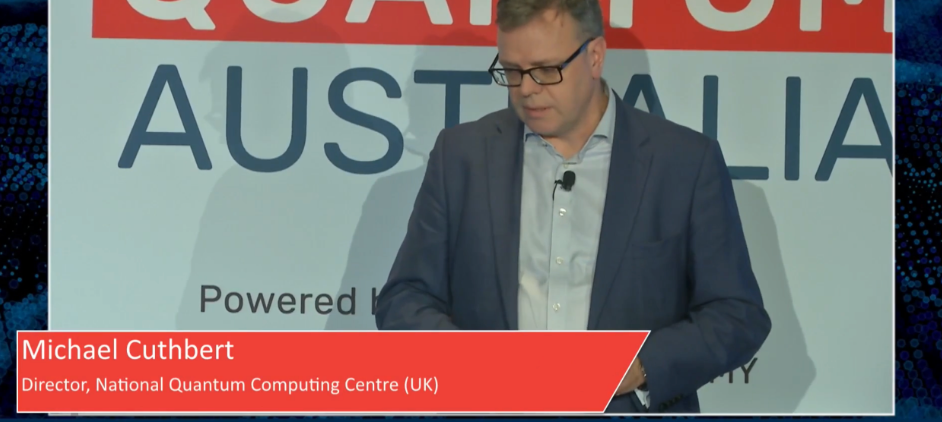NQCC: Purpose & Progress
One of the most interesting presentations at the Quantum Australia 2023 conference was by Michael Cuthbert, Director of the National Quantum Computing Centre (NQCC), based in Didcot, Oxfordshire, UK. In the twenty minutes he was on the podium, Cuthbert gave the audience the lowdown on how the NQCC was established, as well as talking about its purpose and current progress.
Making it clear from the start the UK takes pride in the fact it was very early into quantum technologies and that the National Quantum Technologies Programme (NQTP) didn’t just start in 2014 from scratch, Cuthbert told the audience of the exciting research work going on at the Communications hub (University of York), the Sensors and Timing hub (University of Birmingham), the Enhanced Imaging hub (University of Glasgow), and the Computing hub (University of Oxford), remarking these places are doing a great job in engaging with industry, transferring technology out of the lab by getting it into industry via startups or through partnerships while also addressing the skills gap which was recognized very early on.
Cuthbert then talked about the immediate next steps for the Centre.
“We’ve got two quantum missions that we’re launching — quantum-enabled PNT with about £35 million and demonstrable quantum advantage really looking at access to state-of-the-art tools, software-enabled computing, benchmarking verification. Then we started the expression of interest and looking at what’s the future of the hub structure,” said Cuthbert.

Myth Buster
Along with the financial considerations connected to building the Didcot facility, Cuthbert also noted other important roles the Centre is playing, particularly in providing trust, assurance and acting as the “myth buster” to the public understanding of quantum computing. But not only this, Cuthbert and his team also want to bring together the supply chain, focusing on developing and enhancing skills in the sector as they play the facilitator for the acceleration of scaling and driving user adoption of the technology.
“How do we give people the tools to start exploring what quantum computing will mean to them in their industry and their science projects and drive user adoption?” he asked the audience. “We’ve got three main areas that we’re exploring kind of technology readiness, initially working in superconducting qubits and trapped ions. This is really building on UK strengths in particular platforms. We’re already doing some landscaping work around neutral atoms and photonics, and we will bring other technologies into the NQCC as we mature, but we needed to prioritize and get started at one place initially, infrastructure.”
The NQCC’s Director discussed the construction work of the Centre, too, describing the new 4000 square metre facility with optics labs, cryogenic labs and its high-performance computing capabilities, (where construction started in February 2022 with a planned handover due for September of this year) and further mentioned it as a location that will bring people together to collaborate, creating a highly collaborative environment with the support of the Science and Technology Facilities Council (STFC).
Q&A
The short Q&A session at the end of Cuthbert’s presentation was a time for the audience to pick the brain of one of the UK’s top quantum experts.
“So, I think what the NQCC can contribute is this kind of an independent and rigorous view of the landscape, emerging technology options and putting forward proposals to government — not to fund the NQCC more — but to fund the community and where people are best placed with academic research and industry-specific programs which we’ve done, for example with the demonstration of quantum advantage,” said Cuthbert from a question about the NQCC’s next steps and where the UK government’s role is in all this.
“I think the other area is we have been working across a variety of different government departments as a user,” he continued, “rather than government just as the funder, so the government can be more engaged. We will be working with the National Health Service (NHS) and the Met Office where government departments are providing the pool, rather than the external resource community providing the pool.”
Cuthbert commented on how government procurement is important, as the NQCC is working with the likes of the Ministry of Defence and GCHQ as the public face for all of the grand challenges and procurement options going forward.
Another question put to the Centre’s Director was about overseas friends and whether the NQCC anticipates international collaboration as a part of its overall strategy, and not just focusing on UK-based startups and institutions.
“Definitely International,” Cuthbert began, adding that the Centre has been working with Australia’s very own Q-CTRL and American company Rigetti Computing on a headline project with a system hosted by Oxford Instruments, very near the NQCC, as well as other examples. “I think what we always look for is where does it bring value to the UK economy? And how intellectual property is exploited in the UK? But otherwise, we really do want to partner with international friends.”
Featured image: Credit: Quantum Australia
If you found this article to be informative, you can explore more current quantum news here, exclusives, interviews, and podcasts.
















